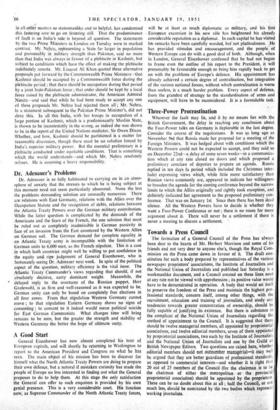Towards a Press Council
The formation of a General Council of the Press has always been dear to the hearts of Mr. Herbert Morrison and some of his friends and not very dear to anyone else's, though the Royal Com- mission on the Press came down in favour of it. The draft con- stitution for such a body prepared by representatives of the various newspaper proprietors' associations, the Institute of Journalists and the National Union of Journalists and published last Saturday is a workmanlike document, and a Council created on these lines need at any rate not be viewed with apprehension ; its positive value would have to be demonstrated in operation. A body that would set itself to preserve the freedom of the Press and maintain the highest pro- fessional standards, concern itself, among other things, with the recruitment, education and training of journalists, and study tendencies towards greater concentration of ownership, should be fully capable of justifying its existence. But there is substance in the complaint of the National Union of Journalists regarding the method of appointment to the Council. It is suggested that there should be twelve managerial members, all appointed by proprietorial associations, and twelve editorial members, seven of them appointed by proprietorial associations, two each by the Institute of Journalist-
• and the National Union of Journalists and one by the Guild of British Newspaper Editors. Two questions arc raised here, whether editorial members should not outnumber managerial—it may wei' be argued that they are better guardians of professional standard,. as opposed to commercial interests—and whether it is right that 20 out of 25 members of the Council (for the chairman is to be the chairman of either the metropolitan or the provincial proprietorial association) should be appointed by the proprietors. There can be no doubt about this at all ; half the Council, or not much less, should be nominated by ttie two bodies which represen` working journalists.


































 Previous page
Previous page